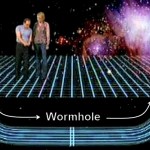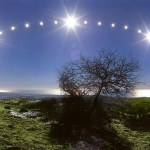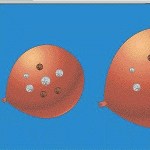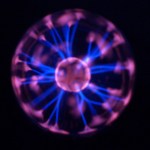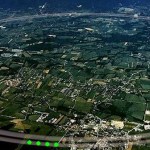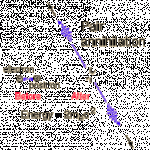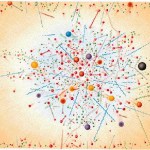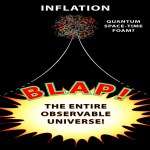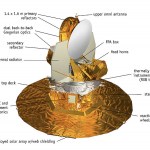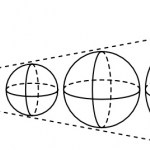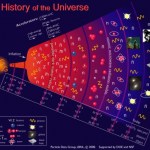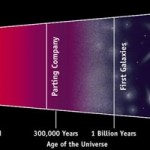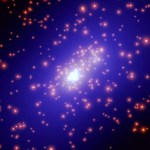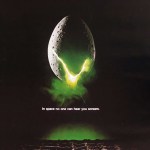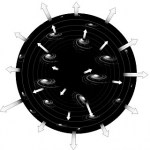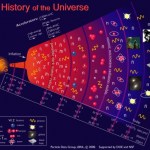Big Bang
"Outside of a dog, a book is a man's best friend. Inside of a dog, it's too dark to read." -Groucho Marx
"While no one has proved that wormholes exist, that does not for a moment keep the more adventurous of thinkers from trying to figure how they might behave."
-Michael Lemonick, Time magazine
Wormholes. We've all heard the word before, and we're used to the concept (thanks to science fiction) that wormholes could be tunnels to either completely different locations in space or in time!
How so? You see, when you get enough mass (or other form of energy) in a small enough space, it becomes…
"Cosmologists are often in error, but never in doubt." -Lev Landau
I've been telling you about the Big Bang, the greatest story ever told, and the entire natural history of the Universe. Let's remind you -- historically -- of how our conception of the Universe changed as we learned more about our surroundings.
Maybe the first astronomical observation ever made was that the Sun rises in the East, passes overhead, and sets in the West. And it does this day after day, every day. It's no wonder that our first "cosmological model" of the Universe was that the Earth is stationary, and the Sun…
The most formidable weapon against errors of every kind is reason. I have never used any other, and I trust I never shall. -Thomas Paine
I've been telling you the history of the Universe over the past few months in serial. Parts 1 through 8 are currently up, and have taken us from Inflation up through the formation of neutral atoms, covering the first 380,000 years of the Universe. During this whole time, like a giant balloon, space has been expanding.
One thing I haven't paid much mind to is just how the Universe has been expanding during this time. The concept is relatively straightforward…
Why must I feel like that?
Why must I chase the cat?
Nothin' but the dog in me. -George Clinton
(And I'll get it stuck in your head, too, if you like. Have a go at the extended 10-minute version.)
Welcome back to the next installment of The Greatest Story Ever Told: the history of the Universe! We started from Inflation -- the phenomenon that set up the Big Bang -- and are coming forward in time. Last time, we made it up to the end of nucleosynthesis, where we made all of the elements that the big bang makes: by mass, we have about 76% Hydrogen, 24% Helium-4, trace amounts of Helium-3,…
The stakes are high, and win or lose, worth playing for. -Fred Hoyle
Yesterday was a record-setting day for humanity. Over at CERN, the Large Hadron Collider achieved a new record for the most energy ever created in a laboratory collision in the history of humanity: 7,000,000,000,000 electron Volts, or 7 TeV (Tera- or Trillion-electron-Volts) for short.
Sure, we get energies higher than this all the time from black holes, neutron stars, and other catastrophic processes in space. Occasionally, we even observe them, in the form of Cosmic Rays!
But there are two big differences between cosmic…
Welcome back to The Greatest Story Ever Told, where we're bringing you the story of the Universe. We're going to go from the very beginning -- before the big bang -- up through the present day, and tell you how we got here. This is part seven, and you can always go back for parts 1, 2, 3, 4, 5, and 6. Last time, we got rid of all the antimatter in the Universe by letting it cool enough that every particle-antiparticle pair in the Universe annihilated with one another, producing a huge excess of radiation.
But there was also a little bit of normal matter -- protons, neutrons, and electrons…
Electricity is actually made up of extremely tiny particles called electrons that you cannot see with the naked eye unless you have been drinking. -Dave Barry
Welcome back to our series on The Greatest Story Every Told, where we start from before the big bang and come forward in time to get the Universe we have today. (If you're just joining us, go back for parts 1, 2, 3, 4 and 5.) Last time, we talked about how we made more matter than antimatter (and we clarified some questions). So what does our Universe look like at this point?
Well, the Universe is still full of hot radiation, flying…
Yesterday, I wrote to you about part 5 of The Greatest Story Ever Told, about how the Universe came to have more matter than antimatter in it. And many of you correctly responded that I had given too much detail and not enough explanation.
So, I want to try again for all of you. Here's the explanation, starting at the beginning.
The Universe inflated first, stretching it flat and making it uniform, both everywhere in space and in all directions equally. Then inflation ended, and all the energy that was making it inflate got dumped into particles and radiation. This part, when inflation ended…
For every one billion particles of antimatter there were one billion and one particles of matter. And when the mutual annihilation was complete, one billionth remained - and that's our present universe. -Albert Einstein
Welcome back to our series, The Greatest Story Ever Told, where we're recounting the physical history of the Universe, from before the big bang up through the present day. We're currently in a hot, dense, expanding Universe, filled with equal parts matter and antimatter, bathed in radiation, and it's been only a tiny fraction of a microsecond for all of this to happen.
But…
The New Age? It's just the old age stuck in a microwave oven for fifteen seconds. -James Randi
About two weeks ago, the WMAP (Wilkinson Microwave Anisotropy Probe) team released their seven-year results, and I'm finally ready to tell you all about it. WMAP, remember, is this guy.
By looking at two different points in the sky simultaneously, and looking at the proper frequencies of microwave light (it looks at five different frequencies every time it looks at the sky), it can measure the differences in the intensity of light left over from the big bang everywhere in the sky. Why is this so…
Ever since I was a child I have had this instinctive urge for expansion and growth. To me, the function and duty of a quality human being is the sincere and honest development of one's potential. -Bruce Lee
It isn't only our heros that expand and grow; the Universe does that, too! In the first three parts of our series, we talked about inflation, its end, and the hot big bang. But during all of this time, the Universe has been expanding.
This is probably the most confusing aspect of cosmology, so tread slowly through this. First off, it is space itself that is expanding. It doesn't make…
Nobody can go back and start a new beginning, but anyone can start today and make a new ending. -Maria Robinson
In parts one and two, we covered the very beginning of the Universe as we know it. Specifically, we talked about inflation, which is the process that sets up the Big Bang. Inflation -- to recap -- expands the Universe exponentially fast, driving the matter density to zero and stretching the Universe flat like a balloon getting blown up supremely fast.
But inflation ends, and when it does, all of that stored (i.e., potential) energy that was being used to expand the Universe now…
There is a theory which states that if ever anyone discovers exactly what the Universe is for and why it is here, it will instantly disappear and be replaced by something even more bizarre and inexplicable.
There is another theory which states that this has already happened. -Douglas Adams
We started off our series on The Greatest Story Ever Told by talking about inflation, or a period when the Universe was expanding exponentially. We see plenty of evidence that inflation happened from looking at the geometry of the Universe (it looks like it was stretched flat),
at the fact that the…
Facts do not cease to exist because they are ignored. -Aldous Huxley
People who don't like their beliefs being laughed at shouldn't have such funny beliefs. -Anonymous
Over at The World's Fair, the question of belief in science arose with the provocative question, "Do you believe in the Big Bang?" I thought about it for a few seconds. What popped into my head?
The thought that, 13.7 billion years ago, all of the matter and energy within our observable Universe was concentrated into a space no bigger than the size of a single proton. That the incredibly high densities and temperatures in this…
There are two mistakes one can make along the road to truth... not going all the way, and not starting. -Siddhārtha Gautama, a.k.a. Buddha
Last week, I started a new series on The Greatest Story Ever Told, about the origin and evolution of the Universe. In it, I asserted that inflation is the very first thing we can definitively say anything sensible about, and that it happened before the big bang. This runs contrary to a lot of statements out there by a lot of reputable people, including this "timeline" image from Discover Magazine:
Everything else aside, it's very important to remember…
If you don't know someone's age, over time they may let out clues that tell you when they were born based on what they remember, or things they claim to have done. This can be very inaccurate. My wife said something the other day that would cause anyone to infer that she was at least ten years older than she is, but it turns out the TV show she was referring to came to her home as syndicated re-runs. (My own personal memory of the recently deceased Soupy Sales is a similar example.)
The Universe
You can always ask a person his or her age, but you have to infer the age of inanimate…
Long you live and high you fly
Smiles you'll give and tears you'll cry
All you touch and all you see
Is all your life will ever be. -Pink Floyd
In part I of this series, we talked about a number of different ways -- all using gravity -- to measure the amount of matter in galaxies, clusters of galaxies, and the entire Universe. We got the same measurement no matter which method we used, finding out that 25-30% of the total energy of the Universe is in some type of matter. But, only about 0.5% of the total energy is in stars, which means that nearly all of this matter doesn't give off light! So…
So, I have a small confession for you, my readers. Since I first started writing this blog, I have always solicited questions, and promised to answer the best ones. Recently, this has come back to bite me, as I've started getting more questions than I possibly have time to answer. However, the ones that meet the following criteria:
are of interest to a very broad, general audience,
are clear, well-posed, and straightforward, and
I can actually provide an answer to them,
will, more often than not, get answered right here. This one comes from reader Dan Noyes, who writes:
I have a question…
Recently, a discussion started in one of my comment threads about whether the Big Bang was necessarily valid or not, and whether there were any reasonable alternatives. The answer is that not only is the Big Bang the best theory to explain the start and evolution of the Universe, it's the only one that doesn't make incorrect predictions. Let's see this in action.
This all started in the late 1920s, when we realized that spiral nebulae were not just galaxies, but that these other galaxies were nearly all moving away from us. Moreover, the ones that were farther away from us were moving away…
So, the Universe started with a bang. Everything was hot, dense, and expanding.
It's 13.7 billion years later now, and our Universe is cold and sparse. The temperature of the leftover glow from the big bang -- which used to be over 10^30 degrees -- is now down to 2.7 Kelvin, just barely above absolute zero. The Universe used to be denser than the center of the Sun. Now, on average, the density of the Universe is only about one proton per cubic meter, with mass clumped into stars and galaxies separated by trillions of miles.
But, for all of it, the Universe is still expanding. What's amazing…
